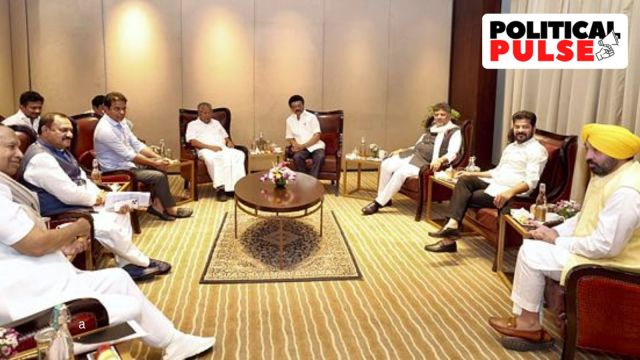Key takeaways of delimitation meet hosted by Stalin: Pitch for 25-yr freeze, federalism panels, Assembly resolutions
Piling pressure on the Centre over their demand for a formal commitment for “fair delimitation”, Oppn CMs and leaders resolve to submit a joint representation to PM Modi during the current Parliament session.
 The meeting culminated in a resolution demanding greater transparency in the delimitation process and an extension of the freeze on the exercise for another 25 years. (PTI Photo)
The meeting culminated in a resolution demanding greater transparency in the delimitation process and an extension of the freeze on the exercise for another 25 years. (PTI Photo)In a show of unity, the Opposition leaders from six states attended the first Joint Action Committee (JAC) meeting on “Fair Delimitation” hosted by Tamil Nadu Chief Minister and DMK president M K Stalin in Chennai Saturday, warning that the proposed reallocation of parliamentary seats on the basis of population could “disempower” southern and other “progressive” states.
Stalin described the looming delimitation exercise as “a test of Indian democracy” and called for collective resistance against political marginalisation.
The meeting, attended by four Chief Ministers, one Deputy CM, and senior leaders from Tamil Nadu, Kerala, Telangana, Karnataka, Odisha, and Punjab, culminated in a resolution demanding greater transparency in the delimitation process and an extension of the freeze on the exercise for another 25 years.
In his opening address, Stalin framed the issue as a fight for survival of these states, not just political arithmetic. He said a state like Tamil Nadu, which had effectively controlled its population through social welfare programmes, stood to lose at least eight Lok Sabha seats if the current formula was implemented. Drawing a parallel with the strife-torn Manipur, he said, “Manipur has been burning for two years, and their voices for justice are unheard because they lack parliamentary strength.”
Rejection of Centre’s ‘vague’ assurance
While Union Home Minister Amit Shah recently claimed that southern states would not lose any seats “on a pro-rata basis,” Stalin dismissed such an assurance as “politically ambiguous” and lacking formal commitment. He also pointed to Prime Minister Narendra Modi’s 2023 Assembly poll campaign speech in Telangana, where the latter had noted that southern states could lose up to 100 seats if delimitation was done purely on a population basis.
The Chennai meet marks the first large-scale political coordination among the Opposition states on an issue in years. While the ruling BJP maintains that delimitation will not hurt southern states, the lack of the Centre’s “formal guarantees” has fuelled their suspicion of redrawing of constituencies favouring the Hindi heartland, where the BJP is the dominant party.
With key players in Tamil Nadu across party lines uniting against delimitation, the fight over the population-based exercise is set to become a major flashpoint ahead of the 2026 Assembly elections and the 2029 Lok Sabha elections in the state.
Resolutions, proposed reforms
The JAC meeting’s final resolution reflected this urgency. It called on the Union government to halt any delimitation exercise that punishes states for good governance, arguing that those who have implemented population control measures should not be penalised.
It also proposed the formation of a core committee of MPs to counter any moves that would weaken the federal structure.
Speaking to the media after the meeting, DMK deputy general secretary Kanimozhi emphasised that the JAC was not about dividing India but ensuring fairness. “We are not against the rights of others, but this is unfair — to let some suffer while others benefit,” she said.
Kanimozhi said that even YSR Congress Party (YSRCP) chief and former Andhra Pradesh CM Y S Jagan Mohan Reddy, who did not attend the JAC meeting, had written to Modi on Saturday, “supporting” Tamil Nadu’s stance. She also linked the issue to the Women’s Reservation law, which the BJP-led government has proposed to implement only after delimitation. “If the government has already tied the Women’s Reservation Bill to delimitation, it means the process is imminent. But there is no clarity, no transparency,” she said, adding that Stalin’s demand for a formal commitment from the Centre is necessary.
Beyond opposing the current delimitation approach, leaders from Telangana, Karnataka, Punjab, Odisha, and Kerala proposed structural reforms to ensure equitable representation.
United front for ‘fair representation’
Telangana CM and Congress leader Revanth Reddy urged the Centre to increase South India’s representation to 33% in the Lok Sabha (up from the current 24%), arguing that states contributing more to the GDP should have a stronger voice in Parliament.
Karnataka Deputy CM and Congress leader D K Shivakumar warned that delimitation was “not a technical adjustment, but a political assault” on southern states. He suggested strengthening the Rajya Sabha as a counterbalance to the North’s numerical dominance in the Lok Sabha.
Punjab CM and Aam Aadmi Party (AAP) leader Bhagwant Mann accused the BJP of “manipulating” seat allocation to benefit Hindi-speaking states, where the party performs well, arguing that Punjab’s representation would be cut primarily because the BJP is “weak” there.
Biju Janata Dal (BJD) chief and ex-Odisha CM Naveen Patnaik, addressing the meeting virtually, called delimitation “unfair” and insisted that states that followed population control policies must be protected.
Bharat Rashtra Samithi (BRS) leader K T Rama Rao called for a permanent freeze on seat reallocation and suggested that if South India contributes 36% of India’s GDP, it should get 36% representation in Parliament.
Kerala CM and CPI(M) veteran Pinarayi Vijayan said if the southern states’ parliamentary representation is further reduced and their share in taxes continue to decline, “we will face an unprecedented situation, in which both our rightful share of funds and our political voice to demand them diminish simultaneously”.
To pile pressure on the Centre, the JAC resolved to submit a joint representation to Prime Minister Modi during the ongoing Budget session of Parliament. Pushing for resolutions in individual state Assemblies to formally oppose the population-based delimitation, mobilising public opinion through awareness campaigns on the historical consequences of past delimitation exercises, and setting up legal panels to explore constitutional safeguards against unfair seat reallocation were among the major points in the JAC’s resolution passed at the meeting.
With the JAC emerging as a formal coalition, Stalin proposed making it a permanent platform for inter-state federal concerns. The momentum is expected to continue, with the next JAC meeting likely to be held in Hyderabad, as proposed by CM Revanth Reddy. Punjab CM Mann also offered to host a subsequent meeting, signalling broader regional alignment beyond the South.
- 01
- 02
- 03
- 04
- 05































